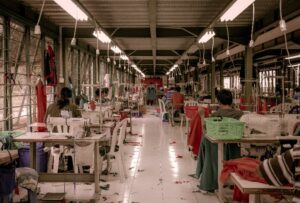Eloise Savill, Private Sector Adviser here at Anti-Slavery International, explains why companies need to move beyond models of social audits if they’re serious about tackling forced labour in their supply chains.

Last week, on 10 February 2022, it was announced that a legal case is being taken against Dyson relating to alleged labour abuses, including forced labour in its supply chain. Among a number of issues, Dyson had reportedly relied, for many years, on social audits to check suppliers’ compliance with ethical standards.
These audits had allegedly not found evidence of unethical recruitment practices or poor working conditions, despite whistle-blowers having reportedly, from as early as 2019, notified Dyson that abusive labour practices had been found. The workers in the legal case are alleging that Dyson has failed in its duty of care to ensure the welfare of workers in its supply chain.
This case once again demonstrates the shortcomings of the social audit model. Social audits are an evaluation of a workplace to assess for social and ethical standards, with the cost of the audit often burdened on the supplier. Social audits are generally extremely ineffective and, even when well-designed, have severe limitations to detect and remedy forced labour.
This is failing those most vulnerable to exploitation. Companies need to move away from a reliance on social auditing and towards worker-centred due diligence processes, which are designed to make sure all workers can exercise their rights, and which prioritise those most vulnerable.
Social auditing: denying the underlying problems

Many social audits have serious shortcomings in their methodology, often with insufficient worker interviews, language barriers and a lack of genuine worker engagement without fear of reprisal, meaning that vulnerable workers are not able to speak out. By necessity, audits will provide only a snapshot of the workplace at a particular time, in a particular place, and not a genuine picture of daily conditions.
All too often, the approach is tick-box and linear, failing to see the big picture which might together constitute forced labour. Forced labour is often hidden, and can be characterised by coercive control, poor recruitment practices, and recruitment fees. This obscures transparency and can be hard to detect without meaningful deep and trusted engagement with workers.
Audits tend to focus solely on the workplace, with this narrow lens often missing indicators of forced labour such as factors relating to accommodation or workers being picked up in the same van. Subcontracting, a very common practice in complex global supply chains, can provide layers between workers who are being exploited and the audited company. Ultimately, it means that these risks and indicators of forced labour are often out of scope of audits.
What’s more, social audits lack transparency with their results, with little ability for scrutiny or opportunity to hold companies to account. This model prioritises protecting company reputation and doesn’t guarantee remediation for workers. There is an incentive for companies to cover up poor practice, with many examples of falsified documents and concealment of violations. Workers experiencing exploitation may also cover up exploitative conditions due to fear of ties being cut with the supplier, leaving them without a job.
Moving forward: engaging with suppliers and respecting workers’ rights

The failure of reliance on social audits can be seen in the legal action which is being taken against Dyson. In this case, there are reports that supervisors instructed workers not to tell the truth about working conditions and hours to auditors, concealed workers who didn’t have permits and distributed safety equipment ahead of the audits.
Dyson’s reported response has been to end its relationship with the supplier, leaving the contract with a six-month break clause. This decision has reportedly left workers in fear of losing their livelihoods. Disengaging from a supplier is often the easy route that companies take in responses to abuses, to mitigate reputational risks. However, this can often leave workers in greater vulnerability. Crucially, even if a company decides to disengage, it must prevent the negative consequences of this and make sure that all victims of past harm receive remedy.
Rather than relying on top-down compliance, companies should work with suppliers on a more equitable basis, building long term relationships, with shared responsibility. This includes how purchasing and sourcing practices within business models can contribute to abuses. It also means working with suppliers to make sure workers have agency, and know and can access their rights. This as a priority should be through trade unions and support for worker-driven mechanisms, and, where not undermining trade unions, meaningful independent grievance mechanism approaches that are co-designed, implemented and monitored by workers and/or their representatives.
Anti-Slavery International: our approach

We need companies to undertake meaningful ongoing due diligence, adapted to local contexts and with workers at the centre, rather than simply an in-and-out audit approach.
At Anti-Slavery International, we have been advising and partnering with companies as a ‘critical friend’ to help prevent and remedy forced labour, and develop more worker-centred solutions in order to address human rights abuses.
We firmly believe that this work must be the responsibility of all companies, and are calling for laws which would legally require all companies to take meaningful steps to prevent forced labour, and make sure all victims can access justice and remedy.
If you’re in the business sector, please contact R.Sherazi@antislavery.org to discuss Anti-Slavery International’s business advisory services and see how you can help fight forced labour and empower local workers.